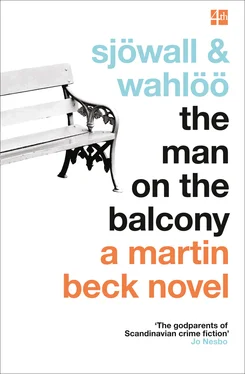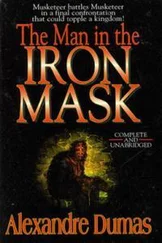‘It seems quite plausible,’ Ahlberg said. ‘The technical investigation was completed today. I tried to phone you but you had already left.’
They were standing on the site of the fire at Borenshult and between the trees they could glimpse the lake and the flight of locks where they had found a dead woman three years earlier. All that remained of the burned-down house were the foundation and the base of the chimney. The fire brigade had, however, managed to save a small outhouse.
‘There were some stolen goods there,’ Ahlberg said. ‘He was a fence, this fellow Larsson. But he'd been sentenced before, so we weren't surprised. We'll send out a list of the things.’
Martin Beck nodded again, then said:
‘I checked up on his brother in Stockholm. He died last spring. Stroke. He was a fence too.’
‘Seems to have run in the family,’ Ahlberg said.
‘The brother never got caught but Melander remembered him.’
‘Oh yes, Melander … he's like the elephant, he never forgets. You don't work together any more, do you?’
Only sometimes. He's at headquarters in Kungsholmsgatan. Kollberg too, as from today. It's crazy, the way they keep moving us about.’
They turned their backs on the scene of the fire and went back to the car in silence.
A quarter of an hour later Ahlberg drew up in front of the police station, a low yellow-brick building at the corner of Prästgatan and Kungsgatan, just near the main square and the statue of Baltzar von Platen. Half-turning to Martin Beck he said:
‘Now that you're here with nothing to do you might as well stay for a couple of days.’
Martin Beck nodded.
‘We can go out with the motorboat,’ Ahlberg said.
That evening they dined at the City Hotel on the local speciality from Lake Vättern, a delicious salmon trout. They also had a few drinks.
On Saturday they took the motorboat out on the lake. On Sunday too. On Monday Martin Beck borrowed the motorboat. And again on Tuesday. On Wednesday he went to Vadstena and had a look at the castle.
The hotel he was staying at in Motala was modern and comfortable. He got on well with Ahlberg. He read a novel by Kurt Salomonson called The Man Outside. He was enjoying himself.
He deserved it. He had worked very hard during the winter and the spring had been awful. The hope that it would be a quiet summer still remained.
5 Contents Cover Title Page MAJ SJÖWALL AND PER WAHLÖÖ The Man on the Balcony Translated from the Swedish by Alan Blair Copyright Praise Chapter 1 Chapter 2 Chapter 3 Chapter 4 Chapter 5 Chapter 6 Chapter 7 Chapter 8 Chapter 9 Chapter 10 Chapter 11 Chapter 12 Chapter 13 Chapter 14 Chapter 15 Chapter 16 Chapter 17 Chapter 18 Chapter 19 Chapter 20 Chapter 21 Chapter 22 Chapter 23 Chapter 24 Chapter 25 Chapter 26 Chapter 27 Chapter 28 Chapter 29 Chapter 30 About the Authors Also by Maj Sjöwall and Per Wahlöö About the Publisher
The mugger had nothing against the weather.
It had started to rain early in the afternoon. At first heavily, then in a steady drizzle which had stopped about seven o'clock. But the sky was still overcast and oppressive and the rain was obviously going to start again soon. It was now nine o'clock and dusk was spreading under the trees. Half an hour or so still remained before lighting-up time.
The mugger had taken off his thin plastic raincoat and laid it beside him on the park bench. He was wearing tennis shoes, khaki trousers and a neat grey nylon pullover with a monogram on the breast pocket. A large red bandanna handkerchief was tied loosely around his neck. He had been in the park or its immediate vicinity for over two hours, observing people closely and calculatingly. On two occasions he had studied the passers-by with special interest and each time it had been not one person but two. The first couple had been a young man and a girl; both were younger than himself, the girl was dressed in sandals and a short black-and-white summer dress, the boy wore a smart blazer and light-grey trousers. They had made their way to the shady paths in the most secluded corner of the park. There they had stopped and embraced. The girl had stood with her back to a tree and after only a few seconds the boy had thrust his right hand up under her skirt and inside the elastic band of her panties and started digging with his fingers between her legs. ‘Someone might come,’ she said mechanically, but she had immediately moved her feet apart. The next second she had closed her eyes and started to twist her hips rhythmically, at the same time scratching the back of the boy's well-trimmed neck with the fingers of her left hand. What she had done with her right hand he had not been able to see, although he had been so close to them that he had caught a glimpse of the white lace panties.
He had walked on the grass, following them with silent steps, and stood crouched behind the bushes less than a dozen yards away. He had carefully weighed the pros and cons. An attack appealed to his sense of humour, but on the other hand the girl had no handbag and also he might not be able to stop her from screaming, which in its turn might impede the practice of his profession. Besides, the boy looked stronger and broader across the shoulders than he had first thought, and anyway it wasn't at all certain that he had any money in his wallet. An attack seemed unwise, so he had crept away as silently as he had come. He was no Peeping Tom, he had more important things to do; in any case, he presumed there wasn't much more to see. Before long the young couple had left the park, now suitably far apart. They had crossed the street and entered a block of flats, the outside of which indicated stable middle-class respectability. In the doorway the girl had straightened her panties and bra and drawn a moistened fingertip along her eyebrows. The boy had combed his hair.
At half past eight his attention focused on the next two people. A red Volvo had stopped in front of the ironmongers at the street corner. Two men were in the front seat. One of them got out and went into the park. He was bareheaded and wore a beige-coloured raincoat. A few minutes later the second man had got out and gone into the park another way; he was wearing a cap and tweed jacket but had no overcoat. After about fifteen minutes they had returned to the car, from different directions and at an interval of some minutes. He had stood with his back to them, looking into the window of the ironmongers, and he had overheard clearly what they said.
‘Well?’
‘Nothing.’
‘What do we do now?’
‘Lill-Jans Wood?’
‘In this weather?’
‘Well…’
‘Okay. But then we have coffee.’
‘Okay.’
They had banged the car doors and driven off.
And now it was nearly nine o'clock and he sat on the bench waiting.
He caught sight of her as soon as she entered the park and knew at once which path she would take. A dumpy, middle-aged woman with overcoat, umbrella and large handbag. Looked promising. Maybe she kept a fruit and tobacco kiosk. He got up and put on the plastic raincoat, cut across the lawn and crouched down behind the bushes. She came on along the path, was almost abreast of him now – in five seconds, perhaps ten. With his left hand he drew the bandanna handkerchief up over his nose and thrust the fingers of his right hand into the brass knuckles. She was only a few yards away now. He moved swiftly and his footsteps on the wet grass were almost silent.
But only almost. He was still a yard behind the woman when she turned around, saw him and opened her mouth to scream. Unreflectingly he struck her across the mouth as hard as he could. He heard a crunch. The woman dropped her umbrella and staggered, then fell to her knees, clutching her handbag with both hands as if she had a baby to protect.
Читать дальше











